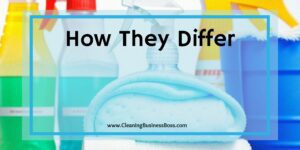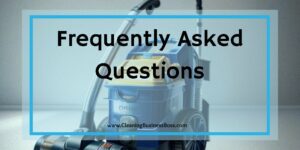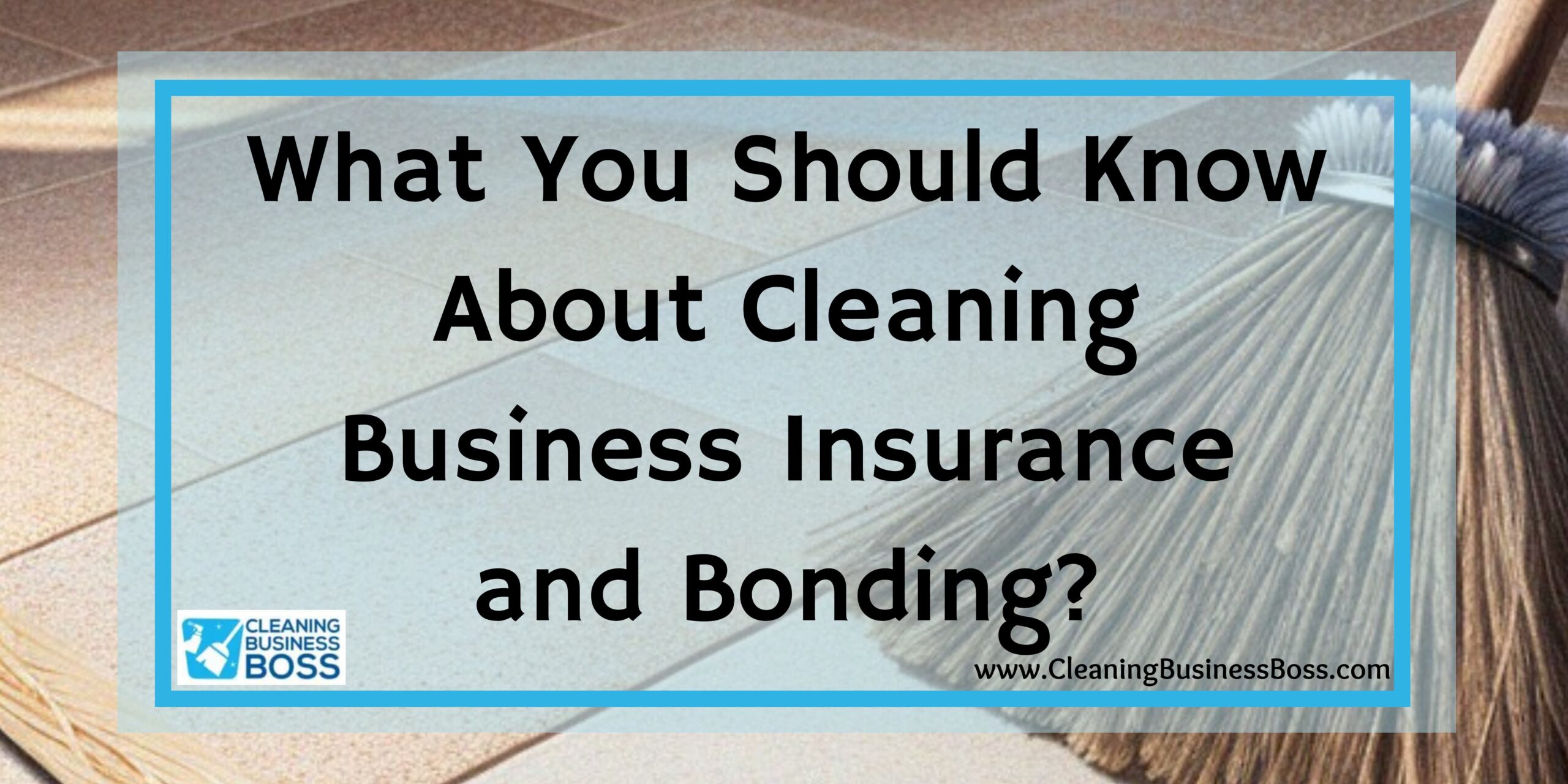In 2015, the United States had approximately 875,000 cleaning businesses that employed 3.5 million people. This exceptionally competitive industry comes with risks to person and property. Most cleaning business owners purchase insurance for those just-in-case situations. Some owners go a step further and obtain a surety bond for their cleaning business.
What you should know about cleaning business insurance and bonding is that every state has its own regulations regarding the requirements of both insurance and bonding. Cleaning business insurance protects the cleaning business owner where the risk-taker is the insurance company. Surety bonds protect the customer of the cleaning business where the risk-taker is the cleaning business owner.
The cleaning industry is comprised of three sectors: commercial cleaners, residential cleaning, and specialized services such as dry cleaning. Every state has business license regulations that must be adhered to, including the types of insurance needed and those that are recommended. In addition, the types of surety bonds available — also known as fidelity bonds — will vary from state to state.
Cleaning Business Insurance
Insurance companies offer a range of insurance products specifically designed to meet the needs of businesses in the cleaning industry. Cleaning business insurance is a general liability policy. It protects the cleaning business in the event of bodily injury, property damage, personal injury, and advertising injury.
Each sector of the cleaning business industry has differing needs when it comes to general liability insurance. For example, a janitorial service working in a corporate office building will need more insurance coverage than a maid service that works in people’s homes. This is because the cost of replacing a broken chandelier in a downtown office will likely be much more expensive than the lamp an employee dropped while dusting in a person’s house.
General liability insurance for cleaning businesses provides coverage in the event of bodily injury of a customer. If a customer gets hurt after slipping on the wet floor, insurance will pay the injured patron. How much money the insurance company pays out depends on the judgment and the insurance policy — which, in turn, depends on the type of cleaning business.
Property damage coverage under general liability insurance will payout in the event the cleaning business caused damage to the property being cleaned. For example, let’s say a carpet cleaning company uses the wrong treatment on a rug and turns a red runner pink. General liability insurance will cover the cost to replace it.
General liability insurance also covers the personal injury of a customer. These less tangible instances of injury can include libel, slander, or invasion of privacy. For instance, let’s say an employee is cleaning an office and finds sensitive documents on a desk. That employee tells someone about what they read and has now leaked private information. Having an insurance policy in place will protect the cleaning business in the event the customer sues for the invasion of privacy.
In addition, having general liability insurance covers any injury in relation to the advertising of the cleaning business. Most instances of being sued for things like copyright infringement or using photos of a customer’s home without permission will fall under the umbrella of the general liability insurance policy.
Cleaning Business Insurance is used by:
- Janitorial Cleaning Companies
- Maid Services
- Carpet Cleaning Businesses
- Window Cleaners
- Dry Cleaners
- Laundry Services
- Floor Cleaners
- Pressure Washer Companies
- Debris Removers
- Trash Removal Services
Janitorial Surety Bond

Surety bonds for cleaning service businesses are an agreement made between three entities: the principle, the obligee, and the surety. The principle is the owner of the cleaning business who purchases the bond. The obligee is the customer of the cleaning business who makes a claim on the bond. The surety is the insurance company holding the bond to be paid to the customer as ordered by a court.
Similar to insurance, surety bonds protect the cleaning business customer from losses. They differ from insurance in that surety bonds protect against loss from theft, larceny, fraud, or any other unethical actions of the cleaning company and its employees. Essentially, janitorial surety bonds assure the customer that a particular company is trustworthy.
Surety bonds are a means of establishing professional credibility. Having a cleaning business fidelity bond in place is a promise to the customer that the cleaning business they hired has no ill intent. It bolsters confidence in the customer that the company will provide honest and reliable cleaning services.
These types of bonds increase the reputation of a cleaning business. Businesses that are bonded and insured attract more long-term customers than those who are not bonded. Surety bonds offer the customer peace of mind that their property is in the hands of honest employees.
In the event an employee of the cleaning business commits financial harm to a customer, the bond will reimburse the customer up to the amount of the established bond. In most cases, the insurance company requires a conviction of the accused before they will pay out the money to the customer. This helps protect both the insurance company and the cleaning business from financial obligation and false claims.
How They Differ

The biggest difference between cleaning business insurance and janitorial surety bonds is the identity of the financial risk-taker. In other words, the entity that is financially responsible for reimbursing the cleaning customer depends on the type of claim made against the cleaning company.
Cleaning business owners pay a set fee, often monthly, to an insurance company for financial coverage of the what-ifs. This is commonly referred to as an insurance premium. When an insurance claim is made against the cleaning company, the insurance pays the cleaning customer up to the amount of the insurance policy. In order to recuperate their money, the insurance company will raise the cost of the monthly premium paid by the cleaning business.
Insurance companies take all of the premium payments from all of the companies they insure and pool that money together. They use that money for paying out on the insurance claims that are filed by the companies they represent. Insurance companies are taking the chance that the businesses they insure won’t file any claims.
When it comes to surety bonds, the cleaning business owner pays a premium just like they do for insurance. Unlike insurance premiums, these payments are more comparative to paying interest on a loan. In this instance, the cleaning business owner pays a set amount of money each month with a promise from the insurance company of being loaned the funds if a claim is made on the bond.
After a court of law has determined the surety bond claim is legitimate, the insurance company pays out the claim to the cleaning business customer up to the amount of the bond. In order to recuperate their loss, the insurance company receives payments from the cleaning company owner until the amount of the bond has been repaid. In this situation, the cleaning business owner is the risk-taker.
Insurance is in place to protect the cleaning business owner and the customer from accidents and unforeseen incidents. Insurance companies rely on probability and the law of large numbers to provide their services and meet financial obligations using the money gained from the premiums their customers pay each month.
Surety bonds are established to protect the cleaning business customer from intentional harm caused by a cleaning business. Because the insurer is not the risk-taker, premiums for surety bonds are often less costly than insurance premiums. The surety bond premiums do not go towards paying back the bond nor are they used to fund the purchased bond.
Price Comparison
Cleaning business insurance premiums can range between $350-$800 per year which is roughly $30-$70 per month. The insurance company takes into account numerous risk factors the cleaning business could face and charges a rate accordingly. Higher risk cleaning companies pay higher premiums in anticipation of the likely need for the insurance company to pay a claim.
Janitorial surety bond premiums typically range from $125 to $650 per year, based on the desired bond amount. That comes out to be around $10-$55 per month for a promised loan amount of $10,000-$100,000 respectively. Unlike cleaning business insurance, the price of the surety bond premium is relative to the number of employees the business utilizes.
Frequently Asked Questions

What other types of insurance does a cleaning business need to consider?
There are 4 additional types of insurance to consider:
Business Owners Insurance
Covers a business from claims caused by fire, theft, or other disasters. Additional policies may be needed for things such as floods and hurricanes.
Worker’s Compensation Insurance
Often referred to as workman’s comp, this pays benefits to an employee if they were injured or became ill in a work-related incident.
Commercial Auto Insurance
Helps foot the bills resulting from an automobile accident while driving a company vehicle.
Commercial Umbrella Insurance
Provides extra liability coverage in the event that a claim exceeds the limit of the business’s general liability policy.
How do you determine how much of a bond your cleaning business should get?
The primary factor that attributes to how much of a bond a cleaning business should acquire is the type of venues the business will be cleaning. Banks, museums, and high-end companies will expect the highest bond available to protect their assets from potential thieves. Maid services that work in people’s homes are not expected to have as high of a bond, unless the houses being cleaned are worth millions of dollars.
To learn more on how to start your own cleaning business, check out my startup documents here.
Please note that the contents of this blog are for informational and entertainment purposes only and should not be construed as legal advice. Any action taken based on the information provided in this blog is solely at your own risk. Additionally, all images used in this blog are generated under the CC0 license of Creative Commons, which means they are free to use for any purpose without attribution.

About the author. Entrepreneur and Cleaning Business Fan.
Hi! I am Shawn and I am a happy individual who happens to be an entrepreneur. I have owned several types of businesses in my life from a coffee shop to an import and export business to an online review business plus a few more and now I create online cleaning business resources for those interested in starting new ventures. It’s demanding work but I love it. I do it for those passionate about their business and their goals. That’s why when I meet a cleaning business owner, I see myself. I know how hard the struggle is to retain clients, find good employees and keep the business growing all while trying to stay competitive.
That’s why I created Cleaning Business Boss: I want to help cleaning business owners like you build a thriving business that brings you endless joy and supports your ideal lifestyle.


1 thought on “What You Should Know About Cleaning Business Insurance and Bonding?”
Comments are closed.